#doctor selma
Note
rookie,how would you react to your mom as a bandit?
Rookie: I'd be surprised but also more confused??? I already have one parent as a bandit which is surprising so finding out they both are would frankly weird me out tbh
Plus I couldn't believe it, my mom is too nice to ever do that kind of thing
#showdown bandit doctor selma#showdown bandit selma#doctor selma#selma#showdown bandit#showdown bandit oc#rookie#showdown bandit rookie
3 notes
·
View notes
Text
Selma Blair's Doctor Said a Boyfriend Would Fix Then-Undiagnosed MS Pain | In Trend Today
Selma Blair’s Doctor Said a Boyfriend Would Fix Then-Undiagnosed MS Pain
Read Full Text
or
Full Article on MAG NEWS

View On WordPress
#Celebrities#Money#Motors#Politics#Selma Blair&039;s Doctor Said a Boyfriend Would Fix Then-Undiagnosed MS Pain#ShowBiz#Sport#Tech#Trends#UK#US#World
0 notes
Text

Pharmacist Lunsford Richardson made Vicks a household name throughout the nation, but his popular product did not do the same for him.
Even in his native North Carolina, where his most celebrated of chemical concoctions has been right under our stuffy noses and on our congested chests for generations, the mention of Richardson’s name elicits blank stares from all but those who study and cherish history.
Richardson’s salve, Vicks VapoRub, helped the world breathe easier during the devastating influenza pandemic of 1918 and during the countless colds and flus of our childhoods, yet most of us couldn’t pick Lunsford Richardson out of a one-man police lineup, much less a who’s who of medical pioneers.
Why didn’t Richardson — by all accounts a creative inventor and smart businessman — ever become as famous as those vapors packed into the familiar squat blue jar?
Because his name wouldn’t fit on the jar.
That’s one version of the story. According to company and family lore, Richardson initially dubbed his promising new product Richardson’s Croup and Pneumonia Cure Salve. Realizing that this name didn’t exactly roll off the tongue nor fit when printed on a small medicine jar, Richardson changed the name to honor his brother-in-law, Dr. Joshua Vick. Another account suggests the inventive druggist plucked the name from a seed catalog he’d been perusing that listed the Vick Seed Co.
The truth may never be known. What is known, though, is that Lunsford Richardson created a medicinal marvel for the ages, the likes of which may never be equaled.
Croupy beginnings
A Johnston County native born in 1854, Richardson loved chemistry and hoped to study it at Davidson College. The college’s chemistry program at the time wasn’t as strong as he’d hoped it would be, so he studied Latin instead, graduating with honors in three years. He returned to Johnston County and taught school, but it wasn’t long before the young man’s love of chemistry got the best of him. In 1880, he moved to Selma to work with his physician brother-in-law, Dr. Vick. It was not uncommon in those days for doctors to dispense drugs themselves, but Vick was so busy seeing patients that he teamed up with Richardson, allowing him to handle the pharmacy duties for him. Richardson relied on his knowledge of Latin to help him learn the chemical compounds required to become a pharmacist, and that’s when he began to experiment with recipes for the product that would become Vicks VapoRub.
It wasn’t until Richardson moved to his wife’s hometown of Greensboro in 1890 that his magical salve and other products he created began to take off.
“He was a man of great intellect and talent,” says Linda Evans, community historian for the Greensboro Historical Museum, which has an exhibit devoted to Richardson and Vicks.
“Druggists at the time fashioned their own remedies a lot, and he created a number of remedies, in addition to his magic salve, that he sold under the name of Vick’s Family Remedies. He was obviously a man of such creativity.”
In Greensboro, working out of a downtown drugstore he purchased (where he once employed a teenaged William Sydney Porter, the future short story writer O. Henry), Richardson patented some 21 medicines. The wide variety of pills, liquids, ointments, and assorted other medicinal concoctions included the likes of Vick’s Chill Tonic, Vick’s Turtle Oil Liniment, Vick’s Little Liver Pills and Little Laxative Pills, Vick’s Tar Heel Sarsaparilla, Vick’s Yellow Pine Tar Cough Syrup, and Vick’s Grippe Knockers (aimed at knocking out la grippe, an old-timey phrase for the flu).
These products sold with varying degrees of success, but the best seller in the lineup of Richardson’s remedies was Vick’s Magic Croup Salve, which he introduced in 1894. And by all accounts, necessity was the key to its success.
“He had what they referred to as a croupy baby — a baby with a lot of coughing and congestion,” explains Richardson’s great-grandson, Britt Preyer of Greensboro. “So as a pharmacist, he began experimenting with menthols from Japan and some other ingredients, and he came up with this salve that really worked. That’s how it all started.”
Another version of the story suggests that all three of the Richardson children caught bad colds at the same time, and Richardson, dissatisfied with the traditional treatment of the day, which included poultices and a vapor lamp, spent hours at his pharmacy developing his own treatment.
Richardson’s salve — a strong-smelling ointment combining menthol, camphor, oil of eucalyptus, and several other oils, blended in a base of petroleum jelly — was a chest-soothing, cough-suppressing, head-clearing sensation. When the salve was rubbed on the patient’s chest, his or her body heat vaporized the menthol, releasing a wave of soothing, medicated vapors that the patient breathed directly into the lungs.
Vicks in the mailbox
In 1911, Richardson’s son Smith, by now a successful salesman for his father’s company, recommended discontinuing all of the company’s products except for Vick’s Magic Croup Salve. He believed the salve could sell even better if the company stopped investing time and money in the other, less successful remedies. He also suggested renaming the salve Vicks VapoRub, according to the company’s history timeline, to “help dramatize the product’s performance.” Richardson agreed, and a century later, the name’s still the same.
Meanwhile, Richardson intensified his marketing efforts by providing free goods to druggists who placed large orders and publishing coupons for free samples in newspapers. He also advertised on billboards and sent promotional mailings to post office boxes, addressed to Boxholder rather than the individual’s name, thus earning him the distinction of being the father of junk mail.
In 1925, Vicks even published a children’s book to help promote the product. The book told the story of two elves, Blix and Blee, who rescued a frazzled mother whose sick child refused to take nasty-tasting medicines. Their solution, of course, was the salve known as Vicks VapoRub.
Expanding and experimenting
As successful as the marketing campaign was, nothing sold Vicks VapoRub like the deadly Spanish flu outbreak that ravaged the nation in 1918 and 1919, killing hundreds of thousands of Americans. Loyal Vicks customers and new customers stocked up on the medicine to stave off or fight the disease.
According to the company’s history timeline, VapoRub sales skyrocketed from $900,000 to $2.9 million in a single year because of the pandemic. The Vicks plant in Greensboro operated around the clock, and salesmen were pulled off the road to help at the manufacturing facility in an effort to keep up with demand.
As the flu spread across the nation, Richardson grew ill with pneumonia in 1919 and died. Smith took over the company. Vicks continued to grow, buying other companies until Procter & Gamble bought it in the 1980s. Through the years, Vicks continued adding new products to its arsenal of cold remedies: cough drops, nose drops, inhalers, cough syrup, nasal spray, Formula 44, NyQuil. And whatever success those products attained, they got there standing on the broad shoulders of Richardson.
Richardson will never be a household name, but his salve has held that status for more than a century — and may do so for the next hundred years. And for Richardson, were he still around, that ought to be enough to clear his head.
A cure-all salve
Vicks users have claimed the salve can cure and heal many maladies. Even though Vicks doesn’t say the salve works for these problems, people still believe.
Toenail fungus: Rub the salve on your toenails, cover with socks, and sleep your fungus problems away.
Cough: For a similar fix to a nagging cough, some believe rubbing Vicks on the soles of your feet can fix the problem.
Dandruff: Rub Vicks directly on the scalp, and your flakes may just disappear.
Chapped lips: Petroleum jelly is one of the ingredients in Vicks, and some say the ointment can help heal cracked lips.
Mosquito bites: If you smooth Vicks on the red bumps on your legs and arms, it can supposedly take the itch right out.
Warts: Dab Vicks on the wart, cover with duct tape, and it may fall off in a few days.
Greensboro Historical Museum
130 Summit Avenue
Greensboro, N.C. 27401
(336) 373-2043
greensborohistory.org
See historical Vicks VapoRub bottles and learn about Lunsford Richardson.
#VICKS#Vicks vapo rub#Lunsford Richardson#Vicks VapoRub#spanish american flu#Spanish flu outbreak#1918#1919#pneumonia#Black Inventors
535 notes
·
View notes
Note
Do you have a timeline about events that happened in your timeline?
Like when the villains + characters were introduced?
I do have a timeline, I hope you have time to read it, it's long.
Lawrence Talbot (universal's Wolfman) gets bitten and turns into a werewolf, killing his family on his first transformation.
Quincey and Larry seek out Doctor Watson for help because they don't know who else to turn too and Watson treated the initial wolf bite. Watson is also suspicious because there were no reports of a wolf escaping from a zoo and there are no wild wolves in Britain.
They begin seeking out possible cures for Larry, this puts them on track for the Jekyll/Hyde encounter. After some convincing Edward joins the team and begins researching a serum to cure Larry.
Research leads them to vampire attacks. Watson recalls that Holmes disappeared searching for an alleged vampire in the countryside. They meet Theo but she doesn't join them, currently Theo is still on team Dracula taking refuge with the brood hanging around Dorian Gray.
Edward has a small breakthrough after speaking to a sailor at a dockside pub one night, he's put on the trail to find Victor Frankenstein's alchemical research. This leads him to Walton's ship and the expedition to the arctic where they encounter the Creature
Adam joins the crew after Watson convinces him. The crew return to England and find that vampire activity has increased, more people have gone missing and they are tipped off by Theo that Dorian Gray has been hosting parties that end in the disappearances of guests.
Selma is summoned by the Harker family to join as she is a vampire hunter, she leaves Texas and arrives in the UK. She and Edward hook up.
The crew investigate Dorian Gray and through Theo's help obtain invitations to his parties. Dorian seduces Adam, while Dorian is distracted the crew hunt for Dorian's portrait. Once the portrait is found the crew get their first insight to devil contracts. They steal the portrait for study. Adam obsesses over Dorian and has to be talked down from stalking and killing him.
Theo is outed as a traitor and has to flee from Dorian's brood. She seeks out the crew for shelter and is offered that Edward will research a cure for vampirism if she actively joins the crew. Theo agrees.
A letter for Sherlock arrives indicating that the managers of an Opera house in Paris are dealing with a haunting. Watson is at first, averse to leaving for France but after a suggestion from Quincey that it might be worth looking into if this Phantom is really supernatural. There is suspicion that the Phantom is a vampire or connected to Dorian Gray as Dorian keeps a residence in Paris and is known to frequent the opera. This leads to the encounter with Erik and the Daroga.
While in France Adam requests that they take a detour to Geneva, he wants to see what became of the Frankensteins after Victor died. He finds that Ernest had survived and the Frankenstein family continues to live there, they have recovered from the tragedy and the new generation is happy and thriving. Adam is relieved and decides not to make contact for the time being but he does sneak into manor and look for more of Victor's research. He is seen by Ernest's granddaughter who instantly realizes what he is. He begs her not to scream and promises that he's not here to do her harm, he only came for Victor's notes. She allows him to take them. He apologizes to her for the harm he caused and she accepts, albeit warily and it's uncertain to Adam if her acceptance was the product of fear. He leaves well enough alone and vanishes into the night.
Further research into Victor's notes reveals that there is a journal missing, efforts to track down the journal reveal it fell into the possession of Doctor Moreau. While the crew gathers to find Moreau they are robbed by Griffin the invisible man in an attempt for him to steal back Dorian's portrait. Griffin is first sensed by Theo who can smell him and later by Edward who can hear his heartbeat. As Griffin tries to escape he is caught in one of Erik's traps. During his questioning at the hands of Edward, who has far too much fun with the interrogation, Griffin escapes.
The crew track down Doctor Moreau, who is hiding on an island in the Mediterranean, Adam is disgusted by the treatment of Moreau's creations and incites them to rebel. He is horrified to discover that Moreau was inspired by Victor's work and used a twisted version of his methods to create the surgically altered "mythical beasts" he controls. The creations rise up and kill their maker, Adam asserts that it was their right to do so.
In Moreau's lab they find clues that lead them to the Faust's homunculus and to the immortal ancient Egyptian, Imhotep (Universal's Mummy) The founder of alchemy and not entirely evil. Imhotep is able to raise the dead but only as soulless husks, he is intrigued by Adam as Adam may present a key to reviving his lost love. Imhotep is convinced to let Adam go and gives up the Homunculus, explaining that it can break a devil's contract.
A mysterious woman named Marguerite (Faust) appears and warns the crew to return to the UK before they get in too deep. Before Watson can question the woman she disappears.
Vampire activity has reached an all time peek. Mina Harker, Quincey's mother, begins to have nightmares and visions. A threatening man revealed later to be Dracula appears in London and seems to be following Quincey. Dorian has fled and his home is now taken over by a vampire named Carmilla who reaches out to Theo with an offer to join her brood. Theo declines, having found a home with the crew. It is revealed that Marguerite is Mephistopheles in disguise and he is building and army with the intent to gain a physical foothold on earth with a long term goal of overthrowing Heaven.
The rest of the story focuses on the crew trying to overthrow Mephistopheles and I am still doing a lot of re-writes and moving things around but this is the broadest roadmap of events.
34 notes
·
View notes
Note
*after the event at the doctors Selma stayed close by your side, she wouldn't so much as let you lift a finger as she was still scared for your well being, she's been oddly quiet though, lost deep in thought*
-@the-final-knight
Selma.. are you ok..? hate seeing you this quiet…
56 notes
·
View notes
Text
youtube
Happy Birthday Ian Anderson, born 10th August 1947 in Dunfermline.
After attending primary school in Edinburgh, his family relocated to Blackpool in 1959. Following a traditional Grammar school education, he moved on to Art college to study fine art before deciding on an attempt at a musical career. He was influenced by his father’s big band and jazz records and the emergence of rock music, but was disenchanted with the “show biz” style of early American rock and roll stars like Elvis Presley.
In 1963 with some school friends he formed his first band The Blades, a soul and blues outfit. In 1965 they regrouped into The John Evan Band with major lineup changes. They disband two years later when Anderson moved to Luton. In his new surroundings, Ian meets the drummer Clive Bunker and the guitarist Mick Abrahams and with Glenn Cornick, a bassist - of The John Evan Band-, Anderson creates the seed of the group that would become the legendary Jethro Tull.
Still enjoying a lengthy if intermittent ongoing career, Jethro Tull has released 30 studio and live albums, selling more than 60 million copies since the band first performed at London’s famous Marquee club.
After undertaking more than 3000 concerts in forty-something countries throughout four decades, Tull has played typically 100 concerts each year to longstanding, as well as new fans worldwide.
Widely recognized as the man who introduced the flute to rock music, Ian Anderson remains the crowned exponent of the popular and rock genres of flute playing. So far, no pretender to the throne has stepped forward. Ian also plays ethnic flutes and whistles together with acoustic guitar and the mandolin bouzouki, balalaika, saxophone, harmonica, and a variety of whistles.
I briefly met Ian on Skye in 1987 on my way back from Benbecula where he had an estate and ran a Fish farm, well 11 fish farms as my research has unearthed, he also employed over 400 people before selling it in the 90’s.
Anderson recalled in an interview how he started as a flautist…
“ once owned a 1960s Fender Stratocaster, which had previously belonged to Lemmy Kilminster before he found fame with Motorhead. But when it dawned on me I was never going to catch up with the growing band of hotshot British guitarists at that time – Jimmy Page, Jeff Beck and Eric Clapton – I traded it in for a Selma Goldfield student flute worth £30.
I knew Jimmy Page and Eric Clapton didn’t play the flute, so I thought I would be in with a chance. A lot of people told me it was a ridiculous trade because the Strat was worth at least £150. But in fact it was a great buy because learning to play it was the start of Jethro Tull.”
Anderson lives on a farm in the southwest of England where he has a recording studio and office. He has been married for 37 years to Shona who is also an active director of their music and other companies. They have two children.
In 2006 and 2010, he was awarded Doctorates in Literature from Heriot Watt University in Edinburgh and the Abertay University of Dundee. He received the Ivor Award for International Achievement in Music.
Ian admits he owns no fast car, never yet having taken a driving test, and has a wardrobe of singularly uninspiring and drab leisurewear varying from light grey to black in colour. He still keeps a couple of off-road competition motorcycles, and a saxophone which he promises never to play again.
Our birthday boy likes to play more intinate venues rather than grand halls, I noticed in the past he has played in religious buildings like cathedrals, he said in an interview ‘Playing in a cathedral gives you a sense of history, responsibility, and humility’ He seems a man after my own heart, while I am not a religious man I do get this same feeling when visiting these sites.. It's not about profits for Jethro Tull, again I have posted that he doesn't charge over the top prices for his tickets, and when he plays in historical places he gives back….The profits from the sales of tickets for my Christmas concert in Bristol Cathedral will go to the upkeep of these sacred buildings, and, perhaps, also in support of the musical liturgy of the church.
Ian admits that he is responsible for an enormous carbon footprint over the years —" I’m a climate sinner — but I’ve planted over 50,000 mixed deciduous trees on our farm. Its heavy clay isn’t not capable of producing arable crops. At best, it grows grass for grazing, but some margins aren’t suitable; so we’ve extended our ancient woodlands with many oak trees. They are an emblem of the Anderson-family clan, whose legend is “Stand sure”.
Jethro Tull are playing Bristol Cathedral on December 11th, tickets are £25-45 snd Salisbury Cathedral next day. These dates are sandwiched between a European tour.
The video features the song, Dun Ringill, from the group's 1979 album Stormwatch, it is an ode to the Iron Age-era fort of the same name. The fort, located on the coast of the Isle of Skye in Scotland, was occupied by the Clan Mackinnon for centuries.[1] The ruins of Castle Ringill, located near Loch Slapin, were located on Anderson's Scottish property, thus inspiring him to write the song. Anderson explained: "
Dun Ringill" [is] about the ruins of an old hillside in the Isle of Skye, off the west coast of Scotland, where Nordic invaders would have landed to pillage and plunder and the local folk would have hidden the women and children and the sheep under fortifications.
It's a cool video, pity it was filmed at Dover rather than on Skye though!
12 notes
·
View notes
Text
Published Aug 1, 2024
The Cancer Community Says After The Loss of Shannen Doherty, It’s Important To Keep Going- A Legacy of Bravery
The 'Beverly Hills, 90210' star candidly shared about her day-to-day fight with metastatic breast cancer up until the end.
By Marissa Sullivan.
An Inspirational Icon
The loss of Shannen Doherty, who died on July 13 of stage 4 metastatic breast cancer at age 53, affected fans and loved ones from around the world, and the cancer community was hit particularly hard by this profound loss.
The Beverly Hills, 90210 actress gave people hope, and despite her passing — which can be especially devastating for other late stage survivors, it’s important to keep going in her honor and not give up that hope that she instilled.
After the death of a loved one or someone you looked up to, it’s key to remember that grief may look different for everyone. The stages of grief are denial, anger, bargaining, depression, and acceptance. These labels help us frame and identify what we may be feeling. These stages can also occur in any order.
As far as your own cancer journey, don’t give up. There are more and more options becoming available for patients to manage symptoms of advanced stage disease, and it’s best to talk about specific treatment plans and what is best for you with your own doctor.
The loss of Shannen Doherty, who died on July 13 of stage 4 metastatic breast cancer at age 53, affected fans and loved ones from around the world, and the cancer community was hit particularly hard by this profound loss.
The Beverly Hills, 90210 star gave people hope, and despite her passing — which can be exceptionally heavy on other late stage survivors, it’s important to keep going and not lose faith in your own journey.
Doherty was over four years into her advanced stage diagnosis and had gained a powerful voice in the health space with her Let’s Be Clear podcast, holding nothing back as she aired out past personal struggles in her career and love live, and candidly spoke of her day-to-day fight.

Actress Shannen Doherty became a household name after starring in hit shows like ‘Beverly Hills, 90210’ and ‘Charmed.’ “This is what I am currently facing. #cancer #life,” Doherty captioned what would be her last video post.
The day the world woke up to the tragic news, comments came pouring in on Instagram for the late pop culture icon.
“Rest in peace. I’m donating to metavivor today in your honor,” one fan commented, while actress Selma Blair shared: “Thank you for showing us how to keep going.”
CEO Alana Stewart — who runs the Farrah Fawcett Foundation in honor of her late best friend’s cancer mission — wrote, “God bless you, you’re an amazing inspiration.”
How to Cope After Losing a Loved One to Cancer
After the death of a loved one or someone you looked up to, it’s key to remember that grief may look different for everyone.
Everyone is entitled to their feelings, and yes, the emotions are real, even if you consider yourself “just a fan.”
The stages of grief are denial, anger, bargaining, depression, and acceptance. These labels help us frame and identify what we may be feeling. These stages can also occur in any order.
The time it takes to navigate these stages can also vary, so giving yourself grace and patience is essential while navigating your feelings.
“It often gets better over time, but on certain days, it can look like depression, and on other days, people look perfectly normal and can function,” Dr. Scott Irwin, a board-certified psychiatrist and Director of Supportive Care Services at Cedars-Sinai Medical Center, previously told SurvivorNet.
‘Grief Comes in Waves’
Dr. Irwin added that grieving people are coming to terms with “the change in their life; the future they had imagined is now different.”
SurvivorNet also had a prior conversation with Megan Newcomer, who lost a close friend to metastatic cancer in 2018. She shared her unique way of coping with grief.
Newcomer’s friend was an athlete and soccer player, so to help her cope, she embarked on a marathon race in his honor, and advises others grieving to first “acknowledge your feelings.”

Shannen Doherty was a passionate animal rights activist. Courtesy of Instagram/Shannen Doherty
“Then, think about a way that you could honor the person through a mechanism that is meaningful to you,” she continued. “So that can be artwork, music, or developing a financial fundraising project. It could be something very simple, but I do think having it be intentional is what you’re doing to help honor this person.”
In a column for SurvivorNet, New York-based clinical psychologist Dr. Marianna Strongin expressed that it may be helpful to remind yourself that these feelings are “meaningful yet temporary.”
“If you approach them with compassion, kindness, and eventually acceptance, you will come away from this period in your life more connected to your resilience and strength,” Dr. Strongin added.
Understanding Metastatic Breast Cancer
Stage 4, or metastatic breast cancer, means that the cancer has spread to distant areas of the body. Even though there is currently no cure for metastatic breast cancer, doctors have many options to treat this advanced stage of breast cancer.
Hormone therapy, chemotherapy and targeted drugs are all options to talk to her doctor about, depending on your individual needs. Sometimes surgery and/or radiation is considered as part of the treatment, but mainly it is important to focus on improving your quality of life.
Dr. Erica Mayer, a medical oncologist at Dana-Farber Cancer Institute, says clinical trials have shown that hormone medicines are more effective when paired with targeted therapies. At some point, chemotherapy will be introduced. And according to Dr. Mayer, it’s delivered at a dose and schedule that’s as well-tolerated as possible.
“We are so lucky in breast cancer that we have so many effective and well-tolerated treatments,” Dr. Mayer previously told SurvivorNet. I’m so gratified to see that patients are doing better and living longer today with metastatic breast cancer than they have ever done before.”
Bottom line, there are more and more options becoming available for patients to manage symptoms of advanced stage disease, and it’s best to talk about specific treatment plans and what is best for you with your own doctor.
Treating Metastatic Breast Cancer
With metastatic breast cancer, the primary goal of treatment is to control its spread. SurvivorNet offers information about what those options are from targeted therapies to chemotherapy and when these various treatment options can be used.
We also provide information on new, exciting research that is currently being tested in clinical trials and information about when recently approved drugs, like immunotherapies, can be used.
For help finding a clinical trial that may be right for you or a loved one, try our easy-to-use Clinical Trial Finder.
While there have been many developments in recent years when it comes to treating late-stage breast cancer, which therapies can be used will depend on the characteristics of the patient’s cancer.
What are the treatment options for late-stage breast cancer?
“Metastatic breast cancer is a treatable disease,” Dr. Kenneth D. Miller, medical oncologist at the Alvin & Lois Lapidus Cancer Institute at Sinai Hospital of Baltimore shared in a pior interview with SurvivorNet.
“Fortunately, we have so many new treatments for women with recurrent breast cancer and for many women who look at this as a chronic disease that they can live with — often for many years.”
*****
RELATED: ‘Stage Four Needs More’: Metastatic Breast Cancer Requires Dramatically More Research Investment’ Say Advocates Mourning ‘90210’ Actress Shannen Doherty
RELATED: For Patients, The Inspiration of a Famous Actress And Her Quest to Make Sure Her Affairs Were in Order — Mourning Shannen Doherty
RELATED: Crusading to Save Horses, Shannen Doherty Says ‘We Have To Speak For The Voiceless’
RELATED: ‘Not Done Living & Loving’ Said Actress Shannen Doherty– She Placed Hope In Experimental Drug Trials To Treat Metastatic Breast Cancer
#shannen doherty#cancer#metastatic breast cancer#breast cancer#rip shannen doherty#grief#loss#mourn#mental health#coping#cancer research#cancer fight#2024#2024 shannen doherty#survivor.net#article#2024 article#health#animal lover#alana stewart#farrah fawcett#selma blair
10 notes
·
View notes
Text
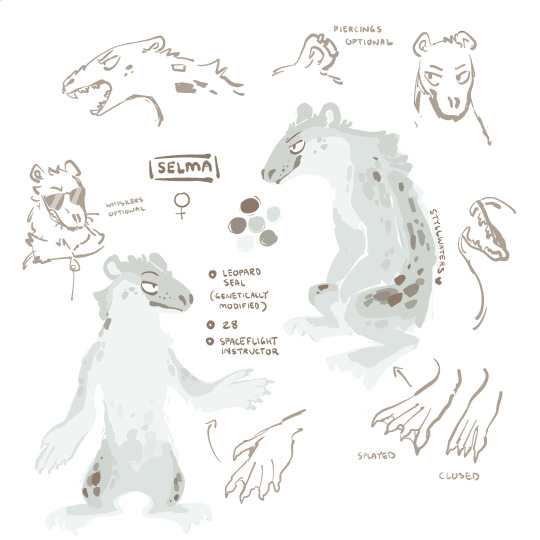

Selma (she/her) is a sophont leopard seal whose lineage is rooted in genetic modification. She has mixed DNA, including human and bear. She is sarcastic, bold, and sometimes blunt, but cares deeply about her students at ESSE.
More info under the cut!
Selma is 28 years old and has had to undergo countless surgeries throughout her life. The unethical experimentation which her ancestors experienced has caused her to develop chronic pain, as well as heart and joint issues. Her unconventional bauplan is a primary factor.
She was born on Hanidias, into a care facility made specifically for GM individuals. An overwhelmingly high percentage of the residents were victims of Genizix. Selma's expected lifespan is 60-65 years, considered a rare and lucky case by her doctors. Most other Earth experiments had a maximum lifespan of 30.
She was raised by a post-human nurse who worked as a spacecraft intelligence for an emergency medical craft - this sparked her love of piloting. Selma was discharged from the facility at 19 years, although she has to return frequently for checkups.
She now works on Kilra at Elvoir's School of Space Exploration, teaching spaceflight classes. After finding Vreaz, she offered to pay for his tuition. In return, Vreaz helps her out in the workshop after school.
Besides piloting, Selma enjoys fashion, cafes, and making reckless decisions.
#the girl is here!!#speculative biology#vivere 44#selma#spec bio#spec evo#leopard seal#my art#art#science fiction#sci fi#space#reference sheet#v44#original character#oc
94 notes
·
View notes
Text
23 Menachem Av 5784 (26-27 August 2024)
The 23rd of Av is the yahrzeit of the philosopher and activist Simone Weil, whose life and death reveal a great deal about the specific cultural milieu of secular Jews in Europe between the world wars. Weil’s Jewishness is complicated by her secular upbringing and her complex engagement with Christianity near the end of her life, but it is her Jewishness in particular that I intend to explore here.
Weil’s father was an Alsatian Jew, whose surname was a product of the wave of Jewish assimilation into French national identity following Napoleon’s emancipation of French Jews. Offered full citizenship rights but still subject to significant interpersonal antisemitism for any recognizable markers of Jewish identity, some French Jews traded clearly Jewish names for newly chosen ones— some of which were still able to signal Jewish identity to other Jews. Weil was one such name, selected by certain French Levi’s as an anagram (W being pronounced in both French and German as V is pronounced in English). Weil’s mother was a Russian Jew whose family had immigrated to Belgium to escape the cycle of pogroms which followed Czar Alexander II’s assassination. Her father accrued significant wealth as an import-export magnate, a large part of which he left to his daughter. Weil’s paternal grandparents were both religiously devout, and deeply distressed by their son’s turn to agnosticism and a secular identity (and particularly his abandonment of kashrus). Her maternal grandparents were less intently religious, but her maternal grandfather was not only fluent in Hebrew but composed Hebrew language poetry, and his widow lived with the Weil family until her death. Both Simone’s parents were deeply intelligent and well educated. Salomea (or Selma, as she preferred to be known) Weil had also wished to be a medical doctor but had been dissuaded by her father, so she settled for marrying a doctor instead. She poured all of her intensity into ensuring the best possible education for her children, Simone and André. The entire family were bibliophiles, and to provide intellectual stimulation to their children Salomea and Bernard Weil also introduced games such as speaking only in rhyming couplets or conducting dinner conversation in one of the family’s several other shared languages. They regularly discussed current events and political theory in the home and Simone became an avowed leftist activist at an early age. Like her husband, Salomea eschewed all Jewish religious practice, but their home life and general cultural outlook will be familiar to many within the Ashkenazi diaspora.
Bernard and Selma’s secularism was also of a distinctly Jewish variety. A significant portion of European Jewry in the fifty eighth century of the Hebrew calendar were deeply attached to the concept of secular culture specifically as an alternative to Christian hegemony, and an escape route from the persistent and violent antisemitism that was such a consistent aspect of Jewish life in Christian Europe. The brutally violent antisemitism of the modern secular governments of Europe, both fascist and communist, had yet to destroy Jewish hopes in secularism as an antidote to prejudice. And the rationalism of European secularism also appealed significantly to Jewish communities that emphasized scholarly pursuits and valued logical reasoning. And the emancipation of Jews which had been a fruit of enlightenment ideals in Christian nations gave Jews the newfound possibility of assimilation into the cultural mainstream without conversion to Christianity. Haskalah and the Reform movement both developed during this period of hopefulness of greater inclusion, and while many Jews, like Simone Weil’s parents, decided to jettison religion entirely, theirs was often a particularly culturally Jewish expression of secularism. This was the mold from which Simone’s childhood was cast. Weil’s parents had experienced antisemitism firsthand throughout their early years and were determined to shield their children from it, and who like many of their secular Jewish contemporaries made the pursuit of knowledge and of progressive social reform its own kind of sacred duty.
Simone’s own early dedication to activism is revealed in an anecdote from her childhood, where after striking up conversations with workers at the resort where her family was vacationing and learning more about their wages and the conditions in which they worked, attempted to persuade them to unionize. She determined early on to devote herself entirely to the cause of a more just world, and did so with a relentlessness that led her college classmates in philosophy to dub her “the categorical imperative in skirts” (It is worth noting that she was the sole female student in her cohort at the time). Weil was deeply impatient with the abstract inquiries of other philosophers, forcefully declaring that “one thing alone mattered in the world today: the revolution that would feed all people on earth” to Simone de Beauvoir. When the latter replied that meaning mattered more than material comfort, Weil retorted “It’s easy to see you’ve never gone hungry.”
Hunger was something that Weil herself knew well. Despite her affluent and indulgent upbringing, she lived a rigorous life of extreme self-denial driven by the belief that she did not deserve to be comfortable while others were suffering. As a young child during the First World War, she refused all sweets after hearing of the deprivations of troops on the front. As Weil grew, she also regularly refused other food, due to a mixture of sensory issues, fears about germs, and moral scrupulosity about the injustice of eating well while others starved. This last trait— of being certain that she ought not to have any comfort which was denied to others— made all social injustices deeply personal matters for Simone. She never learned the art of looking away from other’s suffering that enables a sense of complacency about the state of society, nor did she ever attempt to persuade herself that others deserved their misery.
During her university years, Weil, who had first identified herself as a Bolshevik at the age of 10, persuaded her parents to host Leon Trotsky briefly early in his exile from the Soviet Union. Reportedly, the budding moral philosopher was one of the few people able to silence the revolutionary firebrand in a debate.
Simone’s childhood acts of labor solidarity were also only the first signs of things to come. While many college students enjoyed theorizing about the sufferings of the working class, Weil participated regularly in union demonstrations and preferred the company of striking workers to that of her fellow students. This continued for the rest of her life, and led to the most targeted antisemitic pushback she was to personally experience, as her committed labor activism and extreme commitment to social egalitarianism were interpreted by the conservative press as proof of their theory of Jewish Bolshevism, with educated radical Jews stirring up a laboring class that in the eyes of conservatives clearly would otherwise be perfectly accepting of miserable conditions and pay. Weil eventually became convinced that solidarity with the working class was not sufficient, and that to truly understand the struggle she should become a laborer. To this end she quit her post as an instructor and worked backbreaking shifts on an automobile assembly line, which persuaded her that the physically and mentally draining conditions of modern labor were the greatest obstacle to revolutionary action. The same convictions about direct action and self sacrifice led her to join an anarchist faction in the Spanish Civil War, though her poor eyesight and lack of physical coordination made her more of a liability than an asset in combat. A severe injury in a cookfire accident led to her departure from Spain for medical recovery, and her unit was nearly entirely massacred a month after her departure.
It was in the aftermath of her horrendous and personally devastating experiences in Spain, wracked with survivor’s guilt and a a persistently frustrated desire to sacrifice her own life for a worthy cause, that Weil’s parents took her on holiday in the Italian village of Assisi in an attempt to bouy her spirits, and she wandered into the basilica, where the Catholic Saint Francis had renounced all earthly possessions, and offered up a prayer for the first time in her life. It seems that that root of Weil’s interest in Christianity was the way its most praised figures and its founder and central figure practiced and promoted the exact kind of unrelenting self denial and self abnegation that she herself sought. Another observation of hers, upon seeing a peasant religious procession in Portugal, is telling: “the conviction was suddenly borne in upon me that Christianity is pre-eminently the religion of slaves, that slaves cannot help belonging to it, and I among others.” While at description of Christianity as a religion of slaves was popular among European secularists of all backgrounds, there is a particularly Jewish tradition of associating Christianity with bondage in contrast to Judaism’s emphasis on collective liberation. But Weil, who was certain that she herself should suffer so long as anybody was suffering, also could not conceive of herself as free. Her association with Christian mysticism is thus extremely complicated by her secular Jewish upbringing and personal relationship with suffering and self sacrifice. Weil’s personal flirtation with Christianity continued for the rest of her life, but she repeatedly refused baptism, pointing out the Christian refusal of salvation to atheists and Jews as central to her refusal. She described herself as somebody who loved Jesus but had no love for the church— and it seems entirely obvious why a European Jew on the brink of the Shoah, as deeply aware as she was of the history of European antisemitism and the numerous strands of Christianity at that very moment making their peace with the rise of fascism would be unwilling to reconcile herself to a tradition and community that was not willing to reconcile itself to her without insisting on her erasure through conversion. Weil could be tolerable to Christians only as an ex-Jew, and despite her lack of a religious Jewish upbringing or identity that was farther than she would go. She was willing to sacrifice her life, but not her sense of self or solidarity with her family and all the imperiled Jews of Europe.
Simone did in the end give up her life for her beliefs, though not in any of the heroic ways she had dreamed of. She took her parents to safety in America prior to the Nazi invasion of Germany, fully aware that they too would refuse to leave if doing so meant abandoning their daughter to death. But she did so for their security, wishing herself to be back in France, again heartbroken at the thought that she should have any comfort or safety which was denied to others. She returned to Britain and threw herself energetically into aiding the war effort, serving as a translator for British forces working to aid the French Resistance. Her poor health however kept her from being able to do as she wished and be a radio operative parachuted behind enemy lines. Distraught, she reduced her food intake further and further, convinced that many people were no doubt starving in France under the Nazi occupation. Her associates were convinced that she was overestimating the severity of rationing within France but Simone’s conviction that orders suffered more greatly than she and that she should do all she could to suffer with them was unshakeable. She died on the 23rd of Av 5703 from a heart attack brought upon by starvation.
#cw christianity#cw holocaust#cw shoah#cw antisemitism#cw disordered eating#cw anorexia#hebrew calendar#jewish calendar#judaism#jumblr#assimilated Jews#ashkenazi history#ashkenazi diaspora#jewish secularism#secular jews#Jewish labor activists#Jewish philosophers#Jewish antifascists#Menachem Av#23 Menachem Av#🌗
2 notes
·
View notes
Note
Sorry for this pretty uncomfortable theme but it’s a serious question (feel free to ignore).
Does anyone from the crew have diseases such as syphilis, gonorrhea, chlamydia, HIV and etc?
If Theo picked anything up it was cured when she became a vampire.
I'm kind of amazed "3 continents" Watson never contracted anything tbh but it seems like he's clean.
Adam and Erik haven't had a chance to pick up VIs
Quin and Larry are each other's firsts.
Selma has been lucky but also she tends to be careful about using protection.
....
Tbh I don't want to think about what Edward may have contracted over the 20 years he's been slutting around London. But he's also a doctor so maybe if he caught something he managed to treat it or knows enough how to avoid it.
10 notes
·
View notes
Text
DC Muslim Superheroes
1. Simon Baz aka Green Lantern

2. Ibis the Invincible
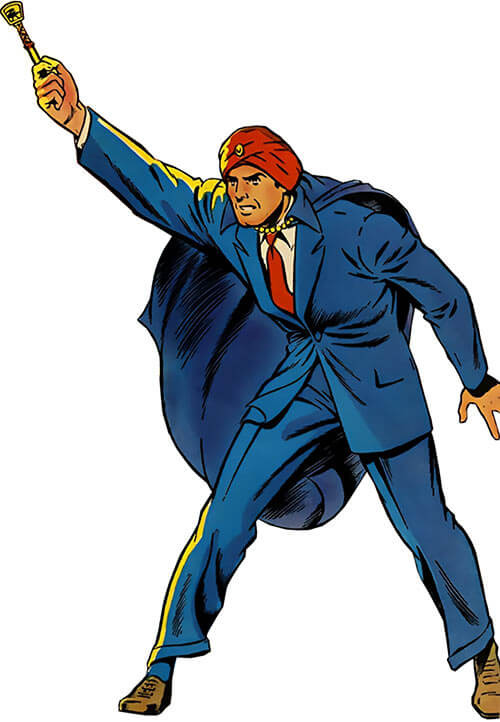
3. Kahina Eskandari aka Iron Butterfly

4. Kahina the Seer

5. Tiger aka Patron - real name unknown; an ally of Dick Grayson

6. Sirocco - full name unknown; an ally of Superman

7. Khalid Nassour aka Doctor Fate
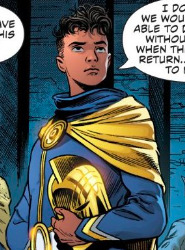
8. Bilal Asselah aka Nightrunner
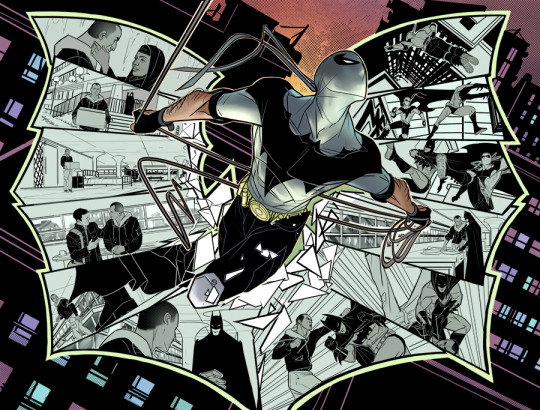
9. Selma Tolon aka Janissary

10. Munira Khairuddin aka Obscura - an ally of Barbara Gordon

11. Summer Zahid - from Teen Titans Academy

12. Rayhan Mazin

13. Sala Nisaba - Tunisian superhero

14. Shuja - real name unknown; ally of Magog

15. Sayeh - Kahina’s sister

16. Salah Miandad aka REMAC

17. Mohammed Qahtanii - from the Green Team

18. Sira Baz - Simon Baz’s sister

19. Hannibal White aka Wise Son

20. Muhammad X - real name unknown; ally of Superman; hero of Harlem

21. Davood Nassur aka Sinbad - ally of Superman
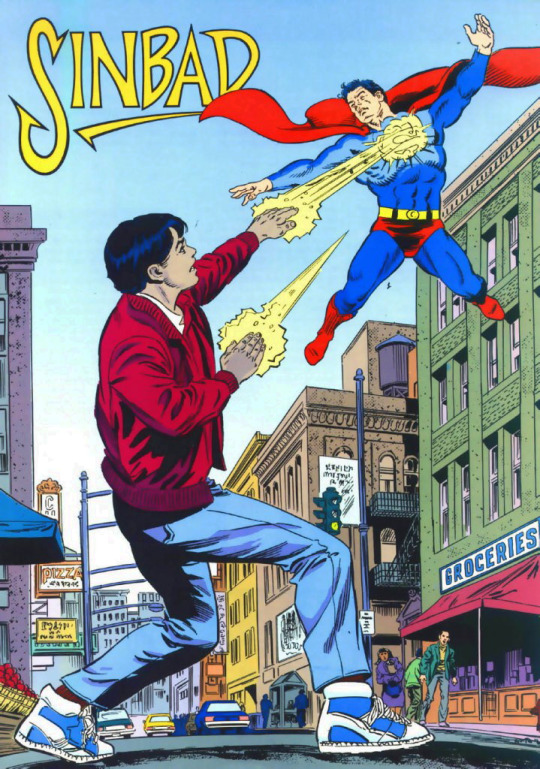
22. Akila - ally of Khalid Nassour’s Doctor Fate
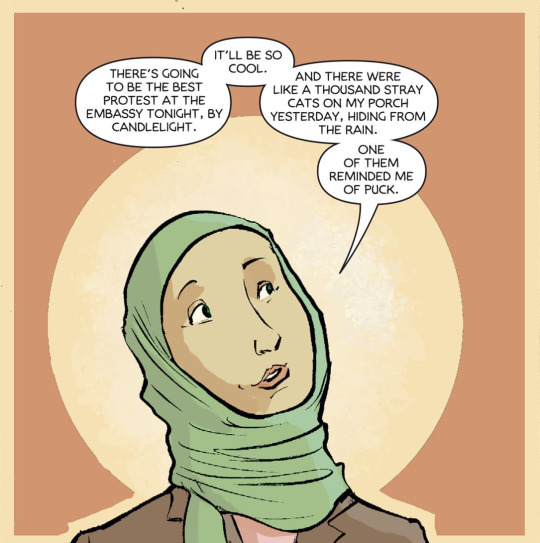
23. Nadimah Ali - ally/friend of Barbara Gordon
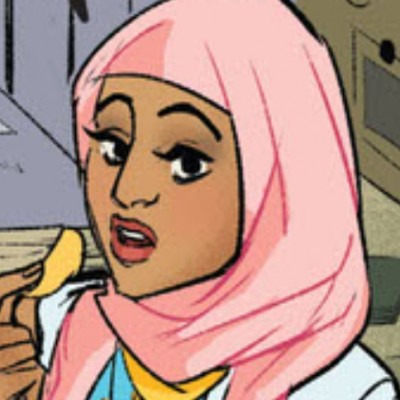
24. Qadir Ali - last name unknown; an ally/friend of Barbara Gordon

25. Shahara Hasan - from the Vertigo “Bodies” storyline

Please list any more if you don’t see any on the list. Be respectful with the comments.
6 notes
·
View notes
Text
Nanny's room (Tickle fic) (Nanny McPhee)
(Note: This scene is set in between where the brown kids apologize to Selma and the wedding).

Cedric Brown went to the doctor to check on Aggie. Blatherwick went to visit one of her aunts and was goig to return on the morning. And the wedding between Cedric and Selma was yet to come in only a week.
Matilda McPhee never trusted Selma, but not for that she would excuse what the children... argh, the children did to her. And again, she wouldn't excuse Cedric for hiding the truth from his, understanding within everything, kids.
She was never one to conect with the kids she took care of. Her job was always going into a home of mean and bad behaved children, giving them lessons, and called it a day. The moment they would love her, or even like her, accept her, or anything, that was her moment to go.
Blatherwick didn't leave anything for the kids or even her, either a lack of responsibility on the part of the cook, or an irresponsible display of hatred towards those boys and girls. Either way, Matilda barely undertood why those kids would get the hate, when their father wasn't even there to listen or educate. It was easier, no? For them, the adults, to barely see the beauty and the good traits of those children. Matilda remembered how surprised she was when Evangeline told her that Lily was teaching her maid to read. How Tore was able to act like a mother to her siblings, even if following their traps and schemes. How smart Eric and Simon were for their age. Simon was definitely going to be a lider once grown up and matured enough.
Those kids were different to the others. Before cooking anything, Matilda McPhee went upstairs to ask the children what they wanted for dinner. Just two steps and she heard muchings from her room. Her room.
Those evil brats.
Matilda found them reading in her room. It was terrifying to see them so still and quiet. But the aura of his antics and his maturity was still there, intact.
''What are you doing here?'' She asked. The children were startled when they heard it.
''You don't care'' Simon replied. Matilda gave him "that" look, the one she had used many times to cast a spell on them, but this time she didn't come with a spell, but with concern. She knew what they were going through.
''You know,'' she told them. ''I'm very proud of what you did yesterday,'' she told them. But none of them seemed proud of what they had done.
''What if she's bad?'' Lily asked. ''In stories, stepmothers are always bad''
''And the parents don't care,'' Simón complained. Matilda, filled with compassion, sat with them. She hadn't had the chance to say something heartfelt to them like that day.
''Her parents love them, and she had the courage to tell them the truth,'' she reminded them. ''It's what a family does''
She gave them a moment to think. Few had realized the depth of those little ones. Not even their own father seemed to understand them at all. Matilda had been able to do it in a month.
''Don't they know how to smile if it's not to cause problems?'' She joked. Tora chuckled. When he stood up to her babysitter, her expression changed to surprise.
''Have you never smiled at us?''
''Never?'' asked the nanny, surprised.
''No,'' Eric stressed, a little amused. ''I thought you hated us''
Matilda smiled again. ''A little discipline and you already think I hate you? this youth of now '' she said jokingly.
''Well, most of the babysitters… we had scared them away within a week…'' Tora reflected. Matilda rolled her eyes. She couldn't blame them. They were still young, and although they had questionable methods, they were only going with what their instincts told them.
After a moment of silence, Crissy and Sebastian approached her. ''Do not go…''
Matilda hugged the girl, praying that they would be guided without her. She couldn't play her replacement mother all her life.
''There are other houses that need me,'' she excused herself. She knew that the others had heard her, and although they didn't say anything in the middle of her reflection, she knew that they thought 'we knew'.
''But we still need you,'' Sebastian insisted. Matilda hugged them. And she wondered how she could…she just leave.
Matilda couldn't stand seeing those children so sad. It was wrong to be naughty, but even more of a party pooper. Someone so sad and depressed.
Out of her mind, she had a playful idea. Just like one day, she remembered, her mother had done to her. She grabbed Chrissy and Sebastian without warning, hearing her questions, and then…
''PFFFFFFFFFFFFFFFFFFFFFTTTTT''
''PFFT, PFFT, PFFT''
They both screamed. ''What are you doing?'' Chrissy asked, blushing with laughter.
''I'm hungry. And my witch instinct can't take it anymore, I have to eat you and your brothers and sisters!!!" McPhee growled, her voice deepening as she spoke.
They were just fake kisses and bites.
Matilda switched her nipping in between Sebastian and Chrissy, making them sloppier with the later. The other kids finally turned to her, surprised that her nanny that so punished them could be so sweet and silly.
''Om nom nom, hmm I could snack on you kids all day long!'' the woman joked on Sebastian's little tummy, pressing her lips towards his belly buttom. That made the little boy squilled. The older kids laughed in low voice, almost making fun of ther nanny. Their mother used to tickle them like that, and since her death they missed her playful self so much.
''He…'' Simon blurted out while smiling a little bit. ''Didn't knew you were like that''
Matilda sealed the twins troture with a raspberry to each on them. She then left them in the bed, rubbing the bellies with her hand. ''I love naugthy kids for dinner. I could snack on any of you'' she looked at Lily hiding behind the sheets. The nanny grabbed the little girl, who squirled and scream too, but with a hidden happiness. Matilda monstrously and playfully kissed the girl's tummy, subtly transitioning to bites thirsty for naughty girl laughter. ''Nam nam nam'' she blurted out, before nuzzling the girl's cheeks.
''NAHAHAHAHA'' Lily screamed, trapped in the witch's arms. After blowing on the girl's belly, Matilda caught Eric, who also hid under the covers. She came to think that the children really wanted her to tickle them/eat them whole. Better for her, the witch thought.
''And now, the smartest one'' Matilda joked, nuzzling the boy's cheeks. Her round, wrinkled, greasy nose made her more adept at being a monster to those brats.
''You're bad!'' Eric tried to free himself, shaking his feet.
''Ouch!'' Matilda complained. ''You hurt me. I guess I'll have to…'' Saying that, she bit the boy's ribs and belly. Eric was, debatably, the most ticklish Brown. As soon as Matilda lightly brushed against his ribs, without really biting or touching, he was already laughing. She left the boy next to his brothers who had already experienced the torture.
All the little ones looked at her. They had never felt anything like that from her, and they felt that that love was with them forever, enough to be able to better endure her farewell to her babysitter.
''Do you love us?'' Chrissy asked. Matilda laughed.
''A lot. Even with all her flaws
Behind the witch, Simón was about to complain slightly. She had punished them for doing wrong, for being naughty, but no…she had not punished them for being creative or resourceful, or intelligent per se.
Just what they did with it.
''Congratulations for putting up with us,'' the boy muttered.
Tora nodded at this. ''Anyone would have left, just in the kitchen''
Matilda caressed the two eldest's hair.
''Will you miss me?'' she asked. The children just snickered. ''Know that if his father catches you being bad children, he will call me and I will come after you little cakes again,'' she growled, before giving Tora a kiss on the cheek.
''Do we have to love you for you to leave?'' asked Simón.
''Only a little. You just have to not need yourself''
''And what do we need from you?'' Sebastian asked. Matilda smiled wistfully, she really would miss them.
''Oh, you'll see'' with that said, she turned to the two oldest brothers and grabbed them tightly, although they asked that ''not them''. It was very easy, even more so than with the little ones who were already hiding under the covers.
''NO, IT WON'T WORK WITH US-'' Simón protested, laughing.
''WE DON'T TICKLE-'' And before Tora could continue, she already felt her babysitter's lips on her belly. It was more difficult, since Simón and Tora kicked a lot, but Matilda managed to get some bites for the ribs and belly of the eldest sister. ''Hmm, you are a delight,'' the witch said, pressing her lips and her nose against the girl's belly, before nuzzling and nibbling on it.
''BAHAHAHA STOAPAHAHAH'' Tora begged.
''Wait, something is still missing'' and the witch blew strongly on the young girl's belly, leaving her free of it, ''And now-''
''DON'T YOU DARE'' Simon shouted as Matilda caressed the boy's belly.
''Don't worry, it'll just be a bite,'' the babysitter joked, playing with her favorite (in quotes) of the Browns. She leaned forward while she took imaginary bites, until finally kissing and biting the naughtiest boy's belly. Simón really screamed, and tried to get free, even though he enjoyed it. Matilda ended up with a raspberry gravy on the boy's navel and a couple of bites.
The Browns looked at her again as the babysitter got out of bed. ''They want more? I'm not full yet,' she joked, moving her fingers toward the children as if she were going to grab them.
''You're bad,'' Lily muttered. Matilda laughed and kissed each of them on her cheek, near the ear of some of hers.
''I always knew they were little cakes at the bottom,'' the babysitter said, moving her fingers over Eric's belly, the last one to receive her kiss. ''Not a word'' she told them.
''Oh, no one will know that you made us look like babies,'' Simon laughed, trying to act defiant, but thanks to Matilda, he couldn't.
Nanny McPhee left they day of the wedding. Bt she left with them the sweet kiss of a lovely witch, thirsty for love and luaghs of recently guided children. If they were women and men of good, it was because of her.
2 notes
·
View notes
Text
It Happened Today in Christian History

June 1, 1909: Rosa Jinsey Young, the valedictorian of Payne University, Selma, Alabama delivered a speech titled “Serve the People.” The nineteen-year-old sat to give her speech because she had worked so hard her body had broken under the strain. She said nothing of her suffering, however, and spoke a message of selflessness instead:
“Every vocation in life implies service. Those who are aspiring for high positions should seek to become the servants of all... The talent we possess is for the service of all. The truth we hold is the truth of all mankind... ‘He that is greatest among you shall be your servant,’ is the language of the Great Teacher. To serve is regarded as a divine privilege as well as a duty by every right-minded man... As we go from these university halls into the battle of life, where our work is to be done and our places among men to be decided, we should go in the spirit of service, with a determination to do all in our power to uplift humanity... It makes no difference how circumscribed opportunities may be, show yourself a friend to those who feel themselves friendless.”
Idealistic as her words may have been, Rosa Young turned them into reality.
Born in Rosebud, Alabama, she was the daughter of a black Methodist circuit rider, and was determined to use her education to better the lot of African-Americans. After several years teaching in Alabama towns, she yearned to open her own school. Believing that this good desire was from God, she stepped forth in faith and opened a private school near home for seven students.
In three terms, the school had grown to 215 students. However, the students’ families were poor and could pay little toward expenses. The cotton crop had fared poorly because of boll weevils and she had no money to keep the school open. After paying her sister, whom she had hired to help her, she only had a few cents left. She turned to her church, to well-to-do whites, and to anyone who might be able to help. Although she received small contributions, it was not enough.
Young went home and prayed. Then it occurred to her to write to the black educator Booker T. Washington at Tuskegee Institute. Washington replied that he was unable to help, but advised her to contact the Board of Colored Missions of the Lutheran Church—Missouri Synod (LCMS). According to Washington, Lutherans were doing more for African-Americans than any other denomination.
The LCMS sent pastor Nils Bakke to investigate. When he found she was telling the truth, he arranged for help. Young joined the Lutheran church and with its aid founded thirty rural schools, a high school, and a teacher training college, on whose faculty she served. She also planted Lutheran churches. Although derided for leaving the Methodists, she defended herself: “I was born and reared in gross darkness, wholly ignorant of the true meaning of the saving Gospel contained in the Holy Bible...I did not know that I could not read the Bible and pray enough to win heaven.”
Young worked tirelessly almost to the end of her 81 years, even mortgaging her own property to keep the work alive. In 1961, Concordia Theological Seminary in Springfield, Illinois awarded her an honorary Doctor of Letters degree. Ten years later, in 1971, she died, having contributed to the education of thousands of students while spreading the Gospel in Alabama. She titled her autobiography Light in the Dark Belt.
#It Happened Today in Christian History#June 1#Rosa Jinsey Young#valedictorian speech#Payne University
16 notes
·
View notes
Text
What Did We Do to the Dr Martin Luther King Jr. ? The Story of A Crossed Out History ?
Be forewarned: this is the historical opinion of an errant opinion. Reverend Martin Luther King Jr. haven’t only being sanitized by white voices; he’s been done so by countless Black voices, within their admiration for him. Something to think about that completely undoes the perception of Dr King’s politics: he wasn’t appealing to white people’s conscience, he was appealing to their internal shame, and by internal shame, I mean the betrayal of the belief they were better than that. It’s 1955 when Martin King Jr. becomes a pastor and a Doctor. Elvis Presley is at the height of his career; white girls are falling apart for diluted and siphoned Black music. But white girls also listen to actual Black music. It’s a time of rebellion and freedom right ?
But what I want to say, is that in some capacity, white people had convinced themselves that they had given enough space to the Negro, that it was enough, and they were proud of their compassion given the savagery of the beings they let amongst their civilized selves. And then Dr Martin Luther King came and decided to use non-violence cynically not as wake up the consciences and attract sympathies, but to taunt white people knowing that their newly constructed self image as “civilized and bloodless” would be tainted forever if they used deathly (insistence on deathy) violence. So they still unleashed the hounds, used high pressure water jets on protestors (Birminghan protest included children, and yes they were hosed).
From Birmingham, Alabama, to St Augustine, Florida, to Selma voting rights movement and Bloody Sunday, Dr Martin Luther King was being extremely strategic. And I believe the opposition between Malcolm X and Dr Martin Luther King Jr. was more a matter of strategies than of philosophies. You’re welcome to debate.
46 notes
·
View notes
Text



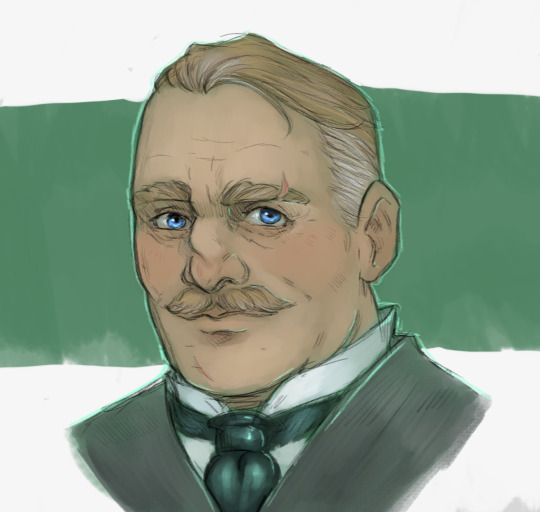





The Motley Crew.
From the top:
Quincey Harker [Oldest son of the Harker family and by all accounts a nice boy]
Henry Jekyll [Well respected doctor, very shady]
Edward Hyde [same as the person above but even worse]
John Watson [Doctor and biographer to the worlds greatest detective]
Adam Frankenstein [8 foot tall homunculus. Daddy issues like you wouldn't believe]
Theo Kipp [Thesbian vampire. Needs a hug]
Lawrence Talbot [Neurotic werewolf. Self-made orphan. Needs a hug even more]
Selma Morris [Vampire hunter. Best sharp shooter in all of Texas. Needs a nap]
Erik [No last name, says he's a ghost. Drama queen.]
#Finally finished with the motley crew#Frankenstein#The phantom of the opera#Sherlock Holmes#The Wolfman#Dracula#Jekyll and hyde#OCs#some of these came out better than others#some could use a little more polish#but I'm glad I got one for everybody
134 notes
·
View notes
Text
Holidays 3.7
Holidays
Alexander Graham Bell Day
Arbor Day (California)
Be Heard Day
Bird Day (California)
Bloody Sunday Anniversary Day (Selma, Alabama)
Chamorro Heritage Day (Guam)
Cybercombine Day (Prudentianopolis)
Doronicum Day (French Republic)
Equal Pay Day (Gleicher Bezahlungstag; Germany)
Finnmarkslopet Dog Sled Race (Finland)
First Planting Festival (Elder Scrolls)
Get Grandma To Write Down Her Meatloaf Recipe Day
Hamilton Lavity Stoutt Day (British Virgin Islands)
International Brick Maker Day
International Day of the Anti-Fascist Woman
International Women’s Day (Angola, Tajikistan)
INTERPOL International Day of Remembrance for Fallen Officers
Jose Abad Day (Philippines)
Liberation of Sulaymaniyah (Iraqi Kurdistan)
Mahasivarathri Day (Sri Lanka)
Maritime Day (Slovenia)
Masaryk Day (Czech Republic, Slovakia)
Maslenitsa (Russia)
National Ben Day
National Carol Day
National Cooper Day
National Day of Lesbian Visibility (Argentina)
National Heroes and Benefactors Day (Belize)
National Sauna Day (Japan)
National Sharon Day
National Slam the Scam Day
National Teresa Day
Neil Diamond Day (Las Vegas)
Nones of March (Ancient Rome)
Plant Power Day (UK)
Say Hello Day
Suez Canal Day
Teacher’s Day (Albania)
Texas Energy Day (Texas)
307 Day
Transport and Telecommunication Workers Day (Turkmenistan)
World Oneness Day
Food & Drink Celebrations
National Cereal Day
National Crown Roast of Pork Day
National Flapjack Day
Punsch Roll Day (Sweden)
1st Thursday in March
Kid Lit Art Postcard Day [1st Thursday]
Nametag Day [Thursday of Name Week]
National Hospitalist Day [1st Thursday]
National Vending Day [1st Thursday]
White Ribbon Day (Massachusetts) [1st Thursday]
World Book Day (Ireland, UK) [1st Thursday]
Independence & Related Days
Aleutian Islands (Declared; 2020) [unrecognized]
Sulaymaniyah Liberation Day (Iraqi Kurdistan)
Festivals Beginning March 7, 2024
Antikmässan (Stockholm, Sweden) [thru 3. 10]
Brazilian Beer Festival (Blumeneau, Brazil) [thru 3.9]
Cincinnati International Wine Festival (Cincinnati, Ohio) [thru 3.9]
Crufts Dog Show (Birmingham, England) [thru 3. 10]
Eastern Bison Association Winter Conference (Harrisburg, Pennsylvania) [thru 3.9]
Fulton Oysterfest (Fulton, Texas) [thru 3.10]
Limassol Carnival (Limassol, Cyprus) [thru 3. 17]
National Coffee Association Convention (Nashville, Tennessee) [thru 3.9]
New England Brew Summit (Portland, Maine)
Red, White & Snow (Park City, Utah) [thru 3.9]
Sustainable Wine Dinner Series (Los Angeles, California)
The WhiskyX (Miami, Florida)
Feast Days
Ardo (Christian; Saint)
Barbara Eden Day (Church of the SubGenius; Saint)
Billy (Muppetism)
Boris Kustodiev (Artology)
Contradiction Day (No It’s Not!; Pastafarian)
The Devil Is God Reversed Day (Everyday Wicca)
Drausius (a.k.a. Drausin; Christian; Saint)
Empodocles (Positivist; Saint)
Edward Landseer (Artology)
Esterwine (Christian; Saint)
Festival for Vedovus (God of the Dead & Volcanic Movements; Ancient Rome)
Impeachment of March Goblins (Shamanism)
José Olallo (Christian; Saint)
Junoalia (Old Roman Festival to Juno)
Leonid Feodorov (Russian Greek Catholic Church)
March Storms and Blasting Rods Day (Starza Pagan Book of Days)
Milton Avery (Artology)
Paul the Simple (Christian; Saint)
Perpetua and Felicity (Christian; Saints & Martyrs)
Piet Mondrian (Artology)
Psyche’s Day (Pagan)
Pierre-Henri Dorie, Siméon-François Berneux (Christian; part of The Korean Martyrs)
Theophylact (Christian; Saint)
Thomas Aquinas, Doctor of the Church (Christian; Saint)
Treachery Day (Church of the SubGenius)
Tuan Reincarnation Day (Celtic Book of Days)
Lucky & Unlucky Days
Sakimake (先負 Japan) [Bad luck in the morning, good luck in the afternoon.]
Umu Limnu (Evil Day; Babylonian Calendar; 11 of 60)
Premieres
Alice the Collegiate (Disney Cartoon; 1927)
The Caine Mutiny, by Herman Wouk (Novel; 1951)
Coal Miner’s Daughter
Foxes (Film; 1980)
The Edible Woman, by Margaret Atwood (Novel; 1969)
Erlkönig, by Franz Schubert (Lied; 1821)
From Genesis to Revelation, by Genesis (Album; 1969)
The Golden Eggs (Disney Cartoon; 1941)
The Grand Budapest Hotel (Film; 2014)
Grateful Gus (Noveltoons Cartoon; 1958)
Highlander (Film; 1986)
The Home Guard (Terrytoons Cartoon; 1941)
The Long Goodbye (Film; 1973)
Mame (Film; 1974)
Mickey’s Grand Opera (Disney Cartoon; 1936)
Mirror (Russian Film; 1975)
Miss Pettigrew Lives for a Day (Film; 2008)
Mr. Peabody & Sherman (Animated Film; 2014)
My Beautiful Launderette (Film; 1986)
The Nude Who Never, by Ted Mark (Novel; 1965)
The Old Mill Pond (Happy Harmonies Cartoon; 1936)
Olive’s Sweepstake Ticket (Fleischer Popeye Cartoon; 1941)
Our Lady of the Flowers, by Jean Genet (Novel; 1943)
Page Miss Glory (WB MM Cartoon; 1936)
Pistol Packin’ Woodpecker (Woody Woodpecker Cartoon; 1960)
Post Office, by Charles Bukowski (Novel; 1971)
A Room with a View (Film; 1986)
Royal Cat Nap (Tom & Jerry Cartoon; 1958)
Sailor Moon (Japanese Anime Series; 1992)
The Six Million Dollar Man (TV Series; 1973)
Stopping by Woods on a Snowy Evening, by Robert Frost (Poem; 1923)
Taboo (Adult Film; 1980)
Things Ain’t What They Used To Be, recorded by Johnny Hodges and his Orchestra (Song; 1941)
Way Out West, by Sonny Rollins (Album; 1957)
Young Americans, by David Bowie (Album; 1975)
Today’s Name Days
Felicitas, Perpetua, Reinhard (Austria)
Bogoljub, Felicita, Perpetua, Teofil (Croatia)
Tomáš (Czech Republic)
Perpetua (Denmark)
Ralf, Raul, Rolf, Rudolf, Ruudi, Ruut (Estonia)
Taika, Tarja, Taru (Finland)
Félicie, Félicité, Nathan (France)
Felicitas, Felizitas, Perpet, Reinhard, Volker (Germany)
Evgenios (Greece)
Tamás (Hungary)
Quintilio, Tommaso (Italy)
Ella, Elmira (Latvia)
Felicita, Galmantė, Rimtautas, Tomas (Lithuania)
Are, Arild (Norway)
Felicja, Nadmir, Paweł, Polikarp, Tomasz (Poland)
Efrem (Romania)
Tomáš (Slovakia)
Felicidad, Perpetua (Spain)
Camilla, Ottilia (Sweden)
Davon, Devan, Deven, Devin, Devon, Devonta, Devonte, Devyn, Dewey, Lothar, Luther (USA)
Today is Also…
Day of Year: Day 67 of 2024; 299 days remaining in the year
ISO: Day 4 of week 10 of 2024
Celtic Tree Calendar: Nuin (Ash) [Day 19 of 28]
Chinese: Month 1 (Bing-Yin), Day 27 (Geng-Wu)
Chinese Year of the: Dragon 4722 (until January 29, 2025)
Hebrew: 27 Adair I 5784
Islamic: 26 Sha’ban 1445
J Cal: 7 Green; Sevenday [7 of 30]
Julian: 23 February 2024
Moon: 10%: Waning Crescent
Positivist: 11 Aristotle (3rd Month) [Thucydides]
Runic Half Month: Tyr (Cosmic Pillar) [Day 13 of 15]
Season: Winter (Day 78 of 89)
Week: 1st Week of March
Zodiac: Pisces (Day 18 of 30)
2 notes
·
View notes